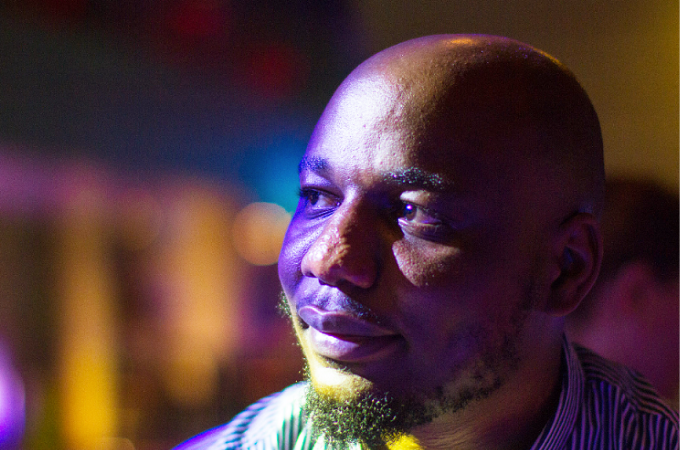
I have always loved curated “Best-Of” science fiction and fantasy (SFF) short story collections, lists, anthologies. The Hugo Winners anthology originally edited by Isaac Asimov was where I first found most of my favorite authors. And the several “Years Best” selections have kept me connected to and aware of the field for a long time. There is just something about stories that move someone enough to want to collect them in a group and say to someone else, “Here, you should read this.”
For the last 7 years, I have highlighted stories that stood out to me in the given year, hoping that the resulting list would fueling discussion and analysis of the growing body of African SFF stories. I did it in 2020, 2019, 2018, 2017, 2016 and 2015.
But 2021 posed several problems. And as we say in Nigeria, problem no dey finish. But not all problems are created equal. Take for example the good problem of African SFF, or to be clearer, the good problem of keeping up with it. For the past few years, I have maintained a working list of (almost) all published African SFF books and stories for the African Speculative Fiction Society at this LINK (I’d like to encourage you to please fill THIS FORM with any works missing from the list). But, 2021 may have been the hardest year to keep up with African SFF stories, especially with so many excellent stories published, an uptick in both quantity and quality and something I am particularly glad to see. I may also have been part of this problem, given that I published two stories last year: “An Arc of Electric Skin” – Published in Asimov’s Science Fiction Magazine, September 2021 and “Comments on Your Provisional Patent Application for An Eternal Spirit Core” in Clarkesworld Magazine, March 2021.
I explored the large crop of Africa SFF stories published last year, and here are 10 that stood out to me. The list is arranged in no particular order.
***
- “Undercurrency” by Sam Beckbessinger (South Africa), UPSHOT: Stories of Financial Futures
This is one of my favourite stories in an exceptionally strong anthology. Edited by Lauren Beukes, for the investment services company, RisCura, working with their investment experts and a star-studded team of African authors, the anthology explores a range of important financial and economic concepts through science fictional, near-future extrapolation. I enjoyed every story in this anthology and I really recommend you read them all but this one stood out to me. A brilliant story focused on climate change, energy transition and sustainable investment, “Undercurrency” follows a South African woman’s attempt to build her company, growing underwater kelp for biofuel on the coast while falling in love and learning about the complexity of doing the right thing in a world of complex and competing drivers. The voice in the story is strong, the description of the romance, while quick, feels natural and the descriptions of the science and the diving are vivid, accurate and wonderful. Full disclosure: I am an engineer in the energy industry and an avid diver, therefore naturally biased or as we say in Nigeria, I am the story’s target market. Consider me sold. Highly Recommended.
- “Paper Suns” by Kemi Ashing-Giwa (Nigeria/USA), Anathema Magazine
Kemi Ashing-Giwa’s story of a young man who is one of a group tasked to help feed their aging living city and what happens when he gets stranded by an ice storm, really struck a chord with me. Its full of excellent and immersive bio-technological worldbuilding, and the characters are strongly drawn and memorable with complex and interesting motivations. These are hallmarks of all of Ashing-Giwa’s work which I’ve read, and I think they appear in their strongest iteration so far in this story which is a highlight of Anathema’s Africa Issue. Recommended.
- “Five Years Next Sunday” by Idza Luhumyo (Kenya), Disruption: New Short Fiction from Africa
SSDA has consistently been putting in the work to not just publish but help create great new African fiction through their prize, workshops, editing and promotion. In 2021, they released the much-awaited Disruption anthology featuring stories from the SSDA prize, and the winning story is a powerful one and I think shares theme with Plangdi Neple’s “Fractured” in Lunaris review which I also enjoyed, but executed more elegantly. In “Five Years Next Sunday,” the narrator is a woman with thick locks of hair that have the power to bring the rain living in the midst of a drought. The hair makes people (mostly men and most of her family) both obsess over and fear her, but it doesn’t stop them from exploiting her when she gets a rich, white patron fascinated by her hair and his female companion “Honey”. What follows is jealousy, infatuation, betrayal. It’s a wonderfully crafted story with a great, authentic voice and magical turns of phrase in every paragraph. Highly Recommended.
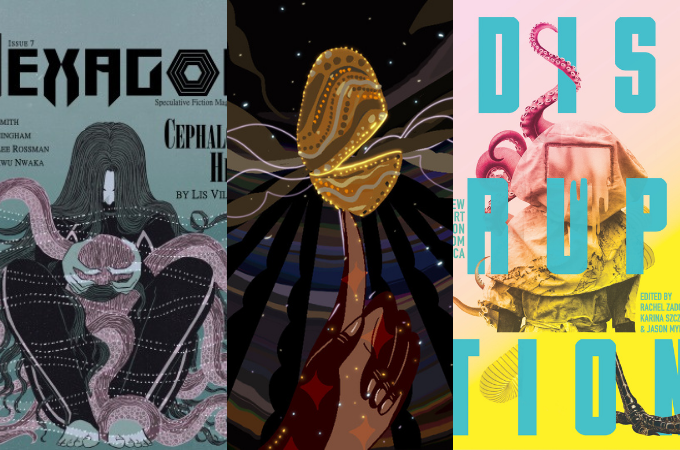
- “The Lamentations of a Veteran of the Sand Wars” by Chinelo Onwualu (Nigeria/Canada), Adi Magazine
A great afrofuturistic story about a man halfway between life and death who is called upon by the spirit of a murdered environmental activist and her still-living colleagues to help save a town that is being taken over by a sand mining company which wants to use their beach sand in order to produce new “environmentally friendly” materials, including solar panels, that have replaced the old petrochemical-based industrial materials. This story is a rollercoaster – funny in parts, deeply sad and profound in others, full of considerations of the corrosive nature of capitalism in all things, it was definitely a memorable story which I highly recommend everyone reads.
- “Shandy” by Gabrielle Emem Harry (Nigeria), Omenana Magazine
2021 was a banner year for Omenana Magazine. They put out 4 issues, all of them full of wonderful African SFF stories, including ones in French. It’s not just quantity that went up this year, I’d also argue that its quality. In fact, I could have easily made a top 10 of Omenana stories alone and so I decided to restrict myself to just one. So while I loved the themes and world of M.H Ayinde’s “The Walls of Benin City”, thoroughly enjoyed the voice in Albert Nkereuwem entertaining, if rushed “Odudu’s Gambit”, loved revisiting the world of “Water Must Fall” and its themes of environmental justice in Nick Wood’s “Bartmann”, was mesmerized by the build-up and exploration of grief and a pandemic-induced isolation and disconnection in Nerine Dorman’s “Arriving from Always”, enjoyed the standard but sharp and perfectly-executed classic sci-fi stylings of Jen Thorpe’s “The Third Option”, loved Dare Segun Falowo’s look at colonialization and resistance through the eyes of the women, leopards and spirits in “Eating Kaolin”, and was completely gutted by the writing and depth of feeling in Tiah Beautement’s beautiful and heavy “Germination”… if I had to pick a favourite of Omenana this year, it would be “Shandy” by Gabrielle Emem Harry. It’s such an enjoyable and charming story about a woman named Ibi who makes contact with an ancestor using la casera to help her with an exam. Turns out her ancestor Mma Asa is persistent, loud, stubborn and proud, not too different from Ibi actually. Their dynamic is hilarious, heartfelt and interesting. It gets more interesting when Ibi meets a man whom she wants to marry but it turns out that his own persistent ancestor has history with Mma Asa. It’s a story vibrating with a very boisterous, argumentative and loving ‘Nigerian-auntie’ energy, and a strong consistent theme that all builds up to a strong resolution. This one is highly recommended.
- “Godmother” by Cheryl S. Ntumy (Ghana), Apex Magazine
A carefully crafted story about connections, faith and trust. In this story, Petty Officer Attah is a family “black sheep” who works for the Department of Authentication, a government branch meant to stamp out disinformation. Assigned to investigate a medical AI named Godmother that seems to be developing a cult following around the people it has healed, Attah finds his worldview completely altered by his interactions with Godmother and comes to a new understanding of self and community. It’s a fascinating story that uses a series of discussions to slowly dig deeper and deeper at its core theme. Recommended.
- “Undersea Lightning” by Uchechukwu Nwaka (Nigeria), Hexagon Magazine
This is a clever climate fiction SF thriller set in a world where the coast of Nigeria has fallen into the Atlantic and there is a bleak continental floor of debris off the new coast called False Bottom that has been the subject of strange events like spontaneous internal lightning. A submersible crew is sent there to rescue the Ijapa, another submersible that was recently lost and they find something deadly and alive and sentient that has been causing the lightning. There was a lot of good climate fiction out this year many of which I enjoyed (including Oghenechovwe Ekpeki Donald’s “O2 Arena” and many stories in Disruption) but this one stood out to me as one of the strongest (there is another on this list). The worldbuilding here is crisp and rich and the concept is fascinating and creative and builds up an appropriate sense of dread and discovery. Recommended.
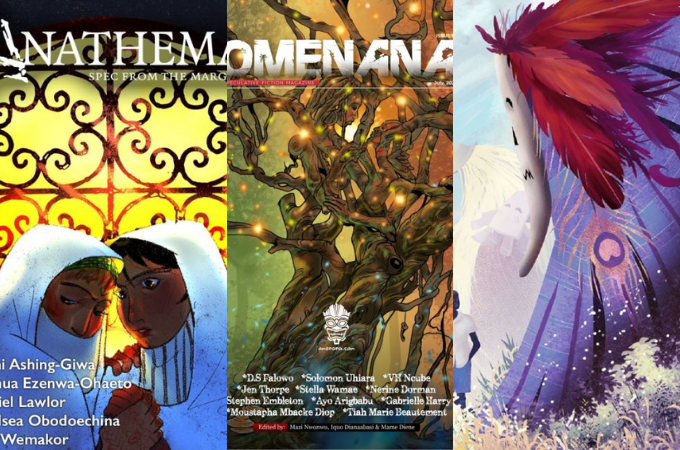
- “Masquerade Season” by Pemi Aguda (Nigeria), tor.com
Another year, another Pemi Aguda story recommendation. It’s not deliberate, or because I’ve known her for over a decade, it’s because she just keeps consistently putting out undeniably brilliant, unsettling, weird and very Nigerian stories that I have taken to calling Nigerian Gothic. This one doesn’t quite fit in that mold but is excellent, nevertheless. In this particular story, a 10-year-old boy meets 3 Masquerades on a road, and they follow him home. His mother admires and then begins to take advantage of them, convincing him to let her cut pieces of them for use in her business. But each cut affects them and in turn her son, slowly chipping until things come to a head. It’s a lovely and deeply moving story about love and sacrifice and duty and giving and the limits of love. As with most of Pemi’s stories, there is not a wasted word here, and reading the story gives one the sense of looking at a master’s work. Highly recommended.
- “Shelter” by Mbozi Haimbe (Zambia), Disruption: New Short Fiction from Africa
Tense. Very tense. That’s the best way to describe this, perhaps my personal favourite story in the aforementioned Disruption anthology. 1st Runner-up for the SSDA Prize, “Shelter,” takes place in a world where acidic dust storms originate from the Sahara seasonally bringing destruction, devastation and death. Our narrator is a woman on the road with her child and on the phone with her husband when one such storm hits, and as time slowly runs out, she tries desperately to get to safety in a “dust shelter”. The writing here is brilliant, the voice is immersive, and the plot is constantly introducing new elements, including an expertly executed twist at the end that ratchets the anxiety to absolute maximum. This one is very highly recommended.
- “An Exploration of Nichole Otieno’s Early Filmography (1232-1246)” by Kola Heyward-Rotimi (Nigeria/USA), Strange Horizons
This was an appropriately strange and fascinating novelette. It does one of my favourite things, which is use an unusual format, this one in the form of an academic paper (the narrator clarifies – with references – that his methodology is to mix memoir and analysis). The paper describes his trip to his former island home, islands that were once colonized to seek out film fragments from a past, famed local director. He meets characters with fragments of the films, participates in local rituals, observes his changed home but isn’t sure how he fits in anymore, and this affects his analysis of the three film fragments he finds, each providing a view into the work of a director who was also navigating these complicated cultural issues at a different time in a different context. The islands, like the films themselves have changed and so has he. It’s a deeply introspective look into legacy of colonization, the sense of postcolonial self and the legacy and purpose of art. There are some ambiguous elements layered into work which enrich as well as confuse. I had to read the story twice to fully appreciate it, but it moved me deeply. This is a beautiful, clever and complex work with a lot to say. Recommended.
***
So that’s it. I hope you read and enjoy these stories as well as the dozens more that were put out last year. And I look forward to more great African SFF in 2022.
**********
Editors note: A version of this post originally appeared on the authors blog here


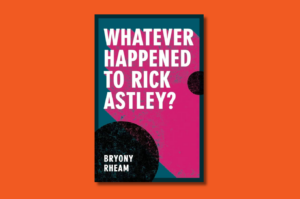
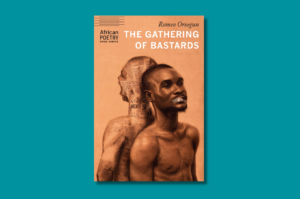


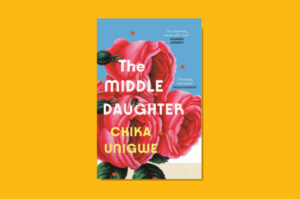

COMMENTS -
Reader Interactions